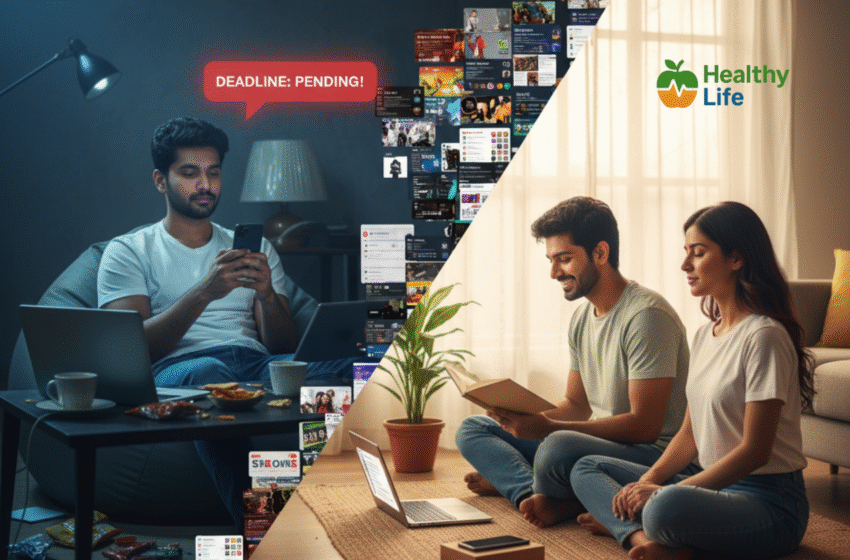Why You Procrastinate: Digital Detox and Behavioral Change in the Indian Lifestyle
- Mental Health
- October 14, 2025
- 190
- 11 minutes read

Procrastinate? Understanding Modern Delay, Distraction, and the Way Forward
Procrastination: Why We Delay, Get Distracted, and How to Move Forward
You’re staring at your task list. That presentation, client call, or study module that should’ve started an hour ago… still untouched. You pick up your phone just to check a message. One reel leads to another. Twenty minutes later, the guilt creeps in.
Sound familiar?
In urban India today, this isn’t occasional-it’s routine. Between non-stop notifications, endless app-switching, and the pressure to always stay “online,” even focused minds are slipping into chronic procrastination.
But here’s the truth: you’re not unmotivated. You’re digitally drained.
Are you really concerned or thoughtful about:
- Why procrastination has become so common in Indian lifestyles
- How digital overload quietly rewires your behaviour
- Small, practical actions you can take to change the cycle
- And why change doesn’t require giving up your phone-just reshaping how you use it
Let’s begin by understanding the root of the problem.
India’s Digital Boom: A Blessing?
India is among the world’s largest consumers of mobile internet. With over 700 million users and counting in 2025 and beyond, we’re tapping, scrolling, streaming, and sharing at unprecedented rates.
Average screen time in metro cities: 6–8 hours/day
92% of 18–30-year-olds in Tier 1 & Tier 2 cities use social media daily
Over 70% of young professionals report checking their phones before getting out of bed
What started as a tool for efficiency-online classes, mobile payments, remote jobs-has now blurred into distraction. We’re not just working on screens; we’re living on them.
“Even in 5-minute breaks, we default to scrolling. This constant engagement, though passive, tricks our brain into thinking we’re productive. In reality, it delays real action.”
– Dr. Shruti Desai, Behavioural Therapist, Pune
The result? Cognitive fatigue, scattered attention, and a quiet disconnection from the task at hand.
Why You Procrastinate: Behavioural Patterns That Fuel Delay
It’s easy to say, “I’ll do it later.” But behind that thought are behavioural triggers shaped by environment and emotion. Here’s what’s happening:
- Avoidance Due to Overwhelm
Tasks often feel too big or unclear. So instead of starting, you avoid-temporarily escaping through screens. It feels harmless, but this delay builds anxiety and compounds guilt.
- The Instant Gratification Trap
Scrolling Instagram or checking WhatsApp gives immediate pleasure-what scientists call dopamine hits. Your brain craves these quick rewards, making deeper, more effortful tasks feel boring.
- Decision Fatigue
From choosing what reel to watch to replying to dozens of messages, digital life throws micro-decisions at you all day. By the time you sit down to focus, your mind is already tired.
- Perfectionism & Fear of Failing
You delay not because you can’t do the task-but because you’re afraid it won’t be good enough. The screen provides a soothing distraction from that internal discomfort.
Real-life scenario:
Kavya, a content strategist in Mumbai, planned to write her client’s campaign brief on Saturday morning. She opened her laptop, got one Slack notification, and then checked Instagram “for 5 minutes.” That turned into 45. The rest of the day felt rushed-and the brief got postponed to Sunday. Again.
The Science Behind Distraction & Delay
Procrastination isn’t just psychological-it’s neurological. When your brain is overstimulated by digital inputs, it begins to crave short, easy loops of action and reward.
Here’s what happens:
Dopamine surges from scrolling condition your brain to seek novelty
Your prefrontal cortex, which controls planning, weakens under constant distraction
Long-term, this creates habit loops: bored ➝ scroll ➝ delay ➝ guilt
“The brain isn’t built for constant input. When everything is urgent and loud, the quiet things-like planning, creating, thinking-are left behind.”
– Dr. Neeraj Mehta, Neurologist, Delhi
Digital Detox: It’s Not a Trend. It’s a Tool.
Forget the dramatic “quit social media forever” advice. A digital detox isn’t about deleting everything. It’s about creating space to think clearly again.
What Digital Detox Actually Means:
- Setting intentional limits on non-essential screen time
- Creating pockets of offline time during your day
- Replacing reflexive scrolling with mindful alternatives
- Relearning how to rest without reaching for a screen
- Practical Detox Ideas for Indian Professionals & Students
Start Small. Stay Consistent.
- Grayscale Mode After 8 PM
Reduces visual stimulation and mindless scrolling. Easy to set on Android/iOS.
- No Screen for First 30 Minutes After Waking
Start with chai, a walk, or journaling instead. Sets a calmer tone for the day.
- One Screen-Free Meal a Day
Whether it’s lunch or dinner-put the phone away. Reconnect with people or your plate.
- App Timer Locks
Use built-in tools (like Digital Wellbeing or Screen Time) to restrict social media usage to 30–60 minutes a day.
- Weekend Mini-Detox
Pick one Sunday every month to stay offline for half a day. Plan activities that ground you-gardening, reading, talking, walking.
Shift Your Behaviour: The Real Procrastination Solution
Digital detox clears the noise. But behaviour change sustains the focus. Here’s how you can rewire your day with intention:
- Use Micro-Tasks
Break every big task into smaller ones. Instead of “Finish project,” say “Write opening paragraph.” You’ll start faster and feel less pressure.
- Create ‘If-Then’ Rules
If I feel like picking up my phone during work, then I’ll take a 5-minute breath break.
This removes decision fatigue and keeps your day structured.
- Redesign Your Environment
Move your charging point away from your bed
Keep your phone outside the room during focused work
Use noise-cancelling headphones or calming playlists
- Track Triggers
Every time you procrastinate, ask yourself:
What was I avoiding?
What emotion came up?
What did I do instead?
Journaling even a few lines daily builds awareness -and progress.
Let’s learn from this Case Study: “I Thought I Was Lazy, Turns Out I Was Overwhelmed”
Rohit, 29, a marketing lead in Bengaluru, felt burnt out. He worked late, scrolled later, and was constantly anxious about missing deadlines.
Here’s what he changed:
- Set app limits: 45 minutes/day for social media
- Used the Pomodoro technique (25-minute work sprints)
- Went offline every Sunday morning
Results after 3 weeks:
- Finished tasks faster, with more clarity
- Reduced screen time by 2.5 hours/day
- Felt calmer, slept better, and began exercising again
“I thought I was disorganized. Turns out, I just needed some quiet in my day.”
HealthyHarsh | Frequently Asked Questions- Health Habits
- Is procrastination a serious issue or just a habit?
It can become a long-term problem affecting work, relationships, and self-esteem if not addressed. It’s often a coping strategy, not laziness. - Do I have to delete social media to beat procrastination?
No. You only need to limit mindless usage. Detox is about control, not cutting off entirely. - How long should a digital detox last?
Start small-try 30-minute windows daily. Over time, increase to half-day detoxes on weekends. - Are there apps to help reduce distractions?
Yes:
Forest App-Stay focused, grow a tree
Digital Wellbeing (Android),
Focus Keeper / Pomodoro Timer
Your Next Step: Don’t Try to Change Everything
Begin with one small shift. Maybe that’s:
- 30 screen-free minutes in the morning
- A daily to-do list with 3 micro-tasks
- Turning off non-essential notifications
You don’t have to be perfect. You just have to begin.
Conclusion: Small Habits, BiConclusion: Change Begins With Awareness, Not Perfectiong Difference
Procrastination isn’t a failure of discipline-it’s often the result of an overwhelmed, overstimulated mind struggling to cut through the noise of modern life. In India’s fast-evolving digital landscape, we’ve built habits around constant connectivity, but forgotten what focus, silence, and intentional action feel like.
The truth is, your brain is not broken. You’re not lazy. You’re navigating a world that rewards urgency, short-term pleasure, and constant input. And the very tools meant to make life easier can quietly erode your ability to act with clarity.
But there’s good news: you can recalibrate-slowly, gently, and on your terms.
You can create space for deep work again.
You can learn to rest without scrolling.
You can replace mindless routines with meaningful micro-actions.
It doesn’t take dramatic overhauls. No detox retreat, no deleting every app. Just small, consistent steps-a screen-free morning, a clearer task list, a pause before the scroll.
Because the opposite of procrastination isn’t perfection-it’s presence.
Being fully with your work, your rest, your moments.
Healthy Harsh wishes to ask: What’s one digital habit you’d like to shift this week?
Drop it in the comments or share with us in the community- because transformation starts in conversation.




